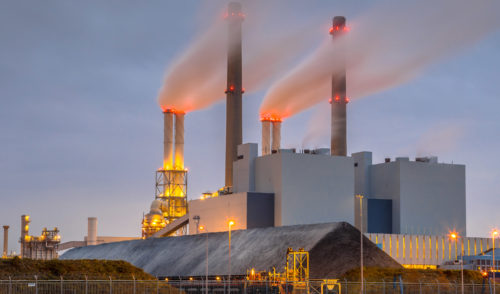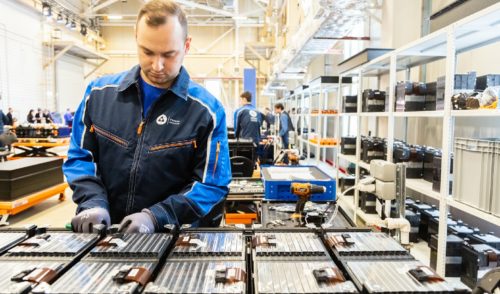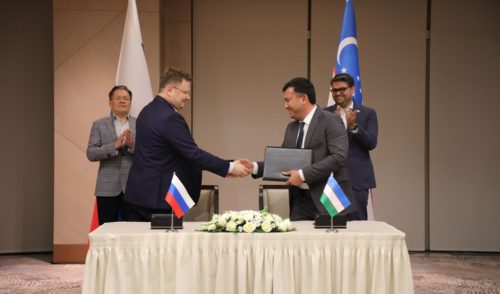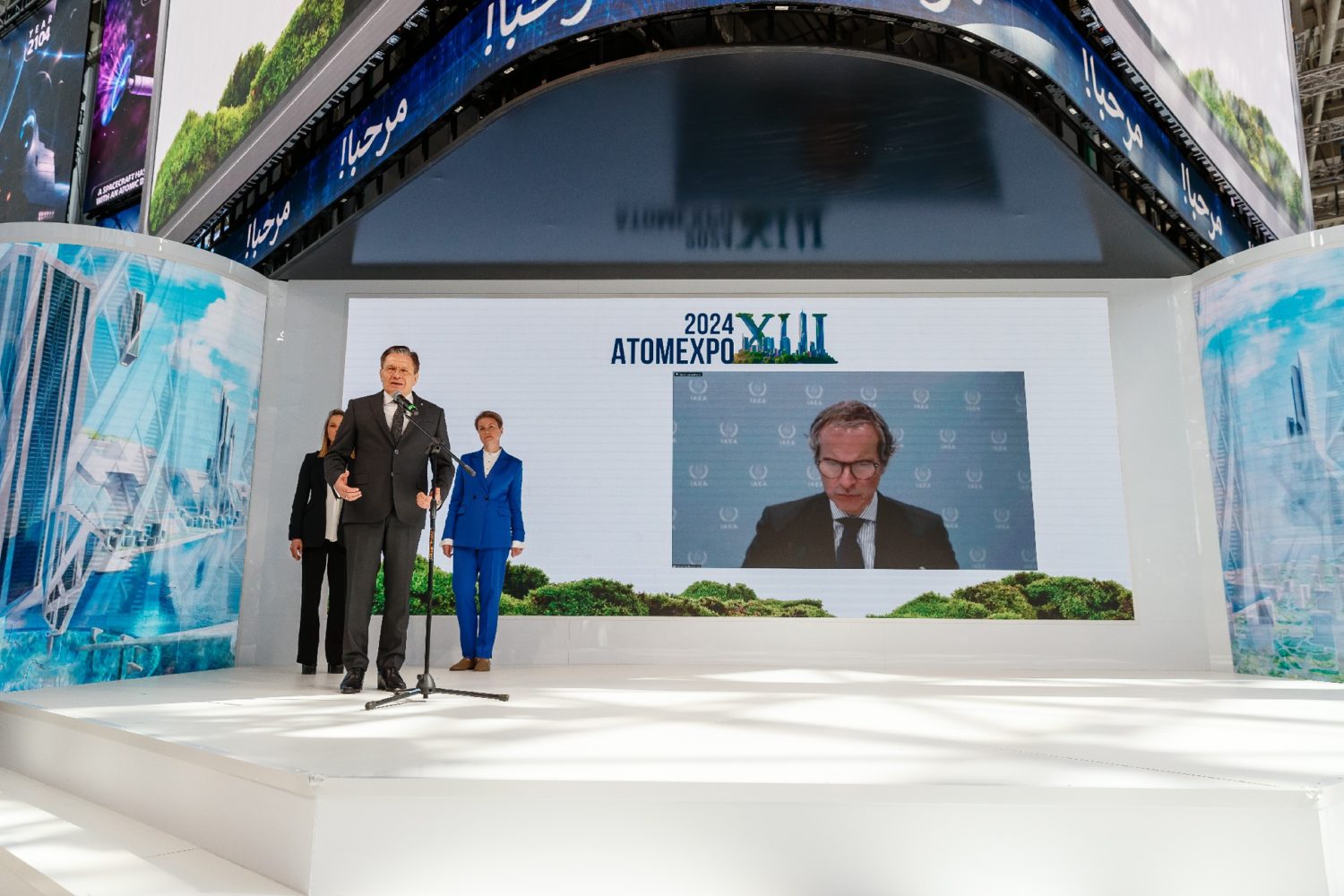
All Nations Welcome
back to contentsIn March, Russia hosted Atomexpo 2024, an international forum, which set a new record with the number of visitors and international delegations as nearly 4,500 delegates from 75 countries took part in the event. Burkina Faso, Mali, Niger, and Iraq joined the forum for the first time. The key topic at Atomexpo was Generation IV reactor technologies, with much discussion extending into international cooperation, small modular reactors, electric mobility, environment protection, digitalization, and other areas.
“Nothing can hold back the progress of nuclear technology, nothing can hold back Rosatom’s progress, and nothing can hold back the progress of our country,” Rosatom Director General Alexey Likhachev said at the opening of the forum.
The motto of the forum was Clean Energy: Creating the Future Together. “Future and together are two key words in the motto. We will discuss the fourth generation of nuclear solutions, thermonuclear fusion, and other technologies. It is only together with all the countries that we can build a clean energy future for our planet,” Alexey Likhachev emphasized.
IAEA Director General Rafael Grossi welcomed the guests via video link: “Rosatom is spurring innovation across Generation III+, Generation IV and small modular reactor technology. Three years ago, we took part in the first concrete pouring for the foundation of the world’s first lead-cooled fast neutron reactor BREST-OD‑300. The IAEA will always be involved in projects like that as we never miss technologies that are future-oriented and on the verge of deployment.”
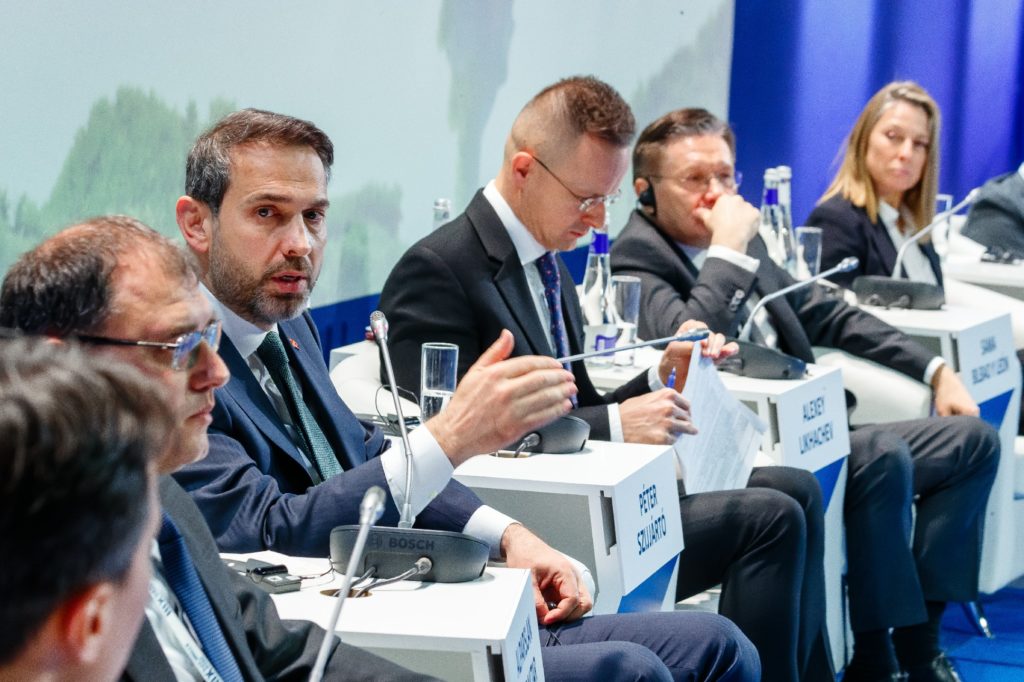
WNA Director General Sama Bilbao y León noted that increasingly more decision makers were recognizing the role of the world nuclear community in addressing such global challenges as, first, climate change, second, energy security and energy independence, and, third, energy equality and energy access. “It is very important for us to demonstrate that the number of successful cases — nuclear projects delivered on time and on budget — is growing. Such cases do exist, and Rosatom, for example, can boast about success in delivering its projects at Akkuyu, Rooppur, El Dabaa, and so on. We should take advantage of this moment to promote nuclear technology in a way it deserves,” she concluded.
Generation IV
Much attention at the forum was paid to Generation IV nuclear technologies. One of the key statements made at the thematic session was that the Generation IV concept extends beyond reactor technology to integrate, among other things, spent nuclear fuel recycling and waste management solutions.
Interest of the forum guests was also drawn to live broadcast from the construction site of Generation IV BREST-OD‑300 reactor. It is being built as part of the Proryv (Breakthrough) project and will be integrated with a fuel fabrication/re-fabrication module (FRM) and a spent fuel reprocessing module. During the broadcast, a carbothermal synthesis line was test-launched at the FRM.
Cooperation with Russia
Representatives of many countries stressed the importance of nuclear cooperation with Russia at the plenary session. As noted by Hungarian Minister of Foreign Affairs and Trade Peter Szijjártó, Europe will lose its competitive power if it does not cooperate with Russia in the nuclear energy sector. According to his estimates, demand for electricity will double in Europe by 2030. It will be impossible to meet the growing demand with renewable energy sources only.
“If there is no nuclear cooperation with Russia, we will not be able to achieve our sustainable development goals,” Peter Szijjártó said.
Turkey’s Minister of Energy and Natural Resources Alparslan Bayraktar stressed the need to expand cooperation between Turkey and Russia. He noted that Turkey intended to work with Rosatom on the plans to build a nuclear station in Sinop. Rosatom will also assist Turkey in building an infrastructure for the deployment of SMRs, training professional staff and developing related industry sectors.
According to Belarus Minister of Energy Viktor Karankevich, Belarus and Rosatom collaborate not only in the construction of nuclear power plants, but also in additive technology, energy storage systems for the power supply and electric mobility applications, nuclear medicine, simulators, digital technologies, and so on.
Alexey Likhachev warned the international community against political divisions in the nuclear industry. He also emphasized the importance of raising public awareness and disseminating knowledge about nuclear technologies.
Topics discussed at Atomexpo 2024
Energy Track:
- Hydrogen economy
- Generation IV nuclear technologies
- Synergies between nuclear and renewables
- SMR deployment
- Nuclear infrastructure
- Closing the nuclear fuel cycle
Science Track:
- Fusion innovations
- Research reactor capabilities
Environment Track:
- Advanced eco technologies
- Nuclear sustainability
- Infrastructure and technologies for radioactive waste management and ultimate disposal
- Transformation of nuclear legacy sites
Education Track:
- Proactive staff training
- International nuclear education initiatives
- Educational partnerships
Industry Track:
- Lights-out factories
- Lithium: integration prospects
- Corporate innovations
- Independent electrical engineering
- International partnerships in composite materials and additive manufacturing
- Rare earth metals production
Digitalization Track:
- Digital factory and smart manufacturing
- Evolution technologies for information infrastructure
- Quantum technologies
Logistics Track:
- Future of electric mobility in cities
- Northern Sea Route capabilities
Healthcare Track:
- Nuclear technologies for food safety


